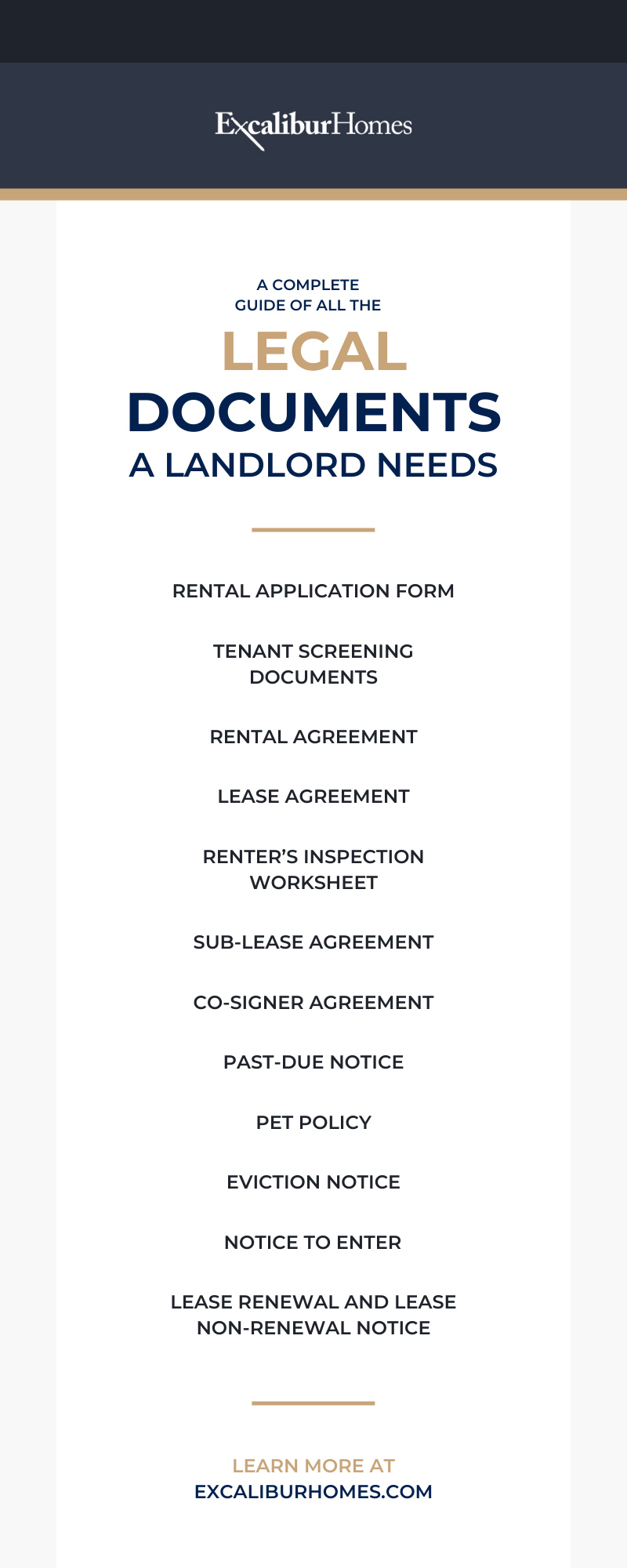
Often, landlords must wear many hats and be knowledgeable about many different things. One of the most complicated aspects of being a landlord is keeping track of all the laws that come with rental properties and the documents that come with those laws. While no guide can have everything, as many states and municipalities have differing laws, there are federal laws that apply to everyone. And to help you keep track, this article will be your complete guide to all the legal documents a landlord needs.
Rental Application Form
Rental applications are the first step toward filling a vacancy and will help you decide whether to approve or deny an applicant. Rental application forms are critical, and you should always have plenty of copies on hand or available to print and fill out on any websites you advertise on. Typically, rental application forms include areas to fill in contact information, employment history, proof of income, and other applicable information.
Tenant Screening Documents
You should have the applicant’s signature first, whether you want to run a criminal background check, a credit score check, contact employers, etc. Ideally, your tenant screening documents should be with your rental application, so you have the proper permissions to perform a tenant screening. This makes the overall screening process much smoother, so you don’t have to keep contacting the applicant for permission.
Rental Agreement
Your rental agreement is another document that will make your life much smoother as its intention is to lay out all your expectations of the tenant. It should highlight the rent amount, due date, guest policy, how to pay rent, and any other relevant information. Having a rental agreement can make it so that your rules and expectations are legally binding instead of in a hard-to-enforce oral agreement.
Lease Agreement
While they may seem similar, a lease agreement and a rental agreement are different because a lease agreement is a lot longer. A rental agreement is a month-to-month agreement, meaning you can change the terms of the agreement at the end of that month. However, a lease agreement is for long-term rentals and cannot be changed as easily. So, depending on how you want to rent your property, you’ll need to choose one or the other.
Renter’s Inspection Worksheet
If you can do so, you may want to schedule a walk-through with the tenant and complete a Renter’s Inspection Worksheet. This is so you can record the property’s condition in detail and have their signature on the inspection. Completing this worksheet with a tenant can ensure that, if any accidents do happen, everyone is aware of their initial condition when the tenant moved in. This narrows down responsibility and lessens the chance of argument over who should pay for what.
Sub-Lease Agreement
As a landlord, you can allow tenants to perform a sub-lease and rent out part of their unit to another tenant. If you allow them to do so, you’ll want to have a sub-lease agreement to ensure every tenant follows the same rules. However, this is not a necessary legal document if you do not wish to allow sub-leases. If you do not allow sub-leases, you should have this written in the rental or lease agreement.
Co-Signer Agreement
Occasionally, you may have a younger tenant that doesn’t have a long rental, credit, or employment history. Because of this, it may be difficult to determine whether they’ll be a good tenant. However, this doesn’t mean that you can’t consider them, as a co-signer agreement may be just what you need. This document ensures that someone else, usually a caretaker of some form, will take legal responsibility and pay rent if the tenant fails to do so.
Past-Due Notice
While it’s never ideal, past-rent due notices are necessary if a tenant is late paying their rent. Typically, this is sent shortly after the payment is past due and is a request for immediate payment. A past-due notice will usually include the address of the property, the amount of money due, any additional late fees, the effective date, and the names of both the tenant and the landlord.
Pet Policy
While you would typically include a pet policy in the lease or rental agreement, tenants may want a pet later, making it a good idea to have a separate copy on hand. Now, legally, it is entirely up to the landlord whether they want to allow pets, so you don’t have to have a pet policy document. However, if you allow pets, you should include the pet security deposit, additional rent, tenant responsibilities, and other relevant information. Pet policies protect you as a landlord from any damages or mishaps that can come with allowing pets.
Eviction Notice
Evictions are undoubtedly challenging to handle, making an eviction notice document essential. Typically, an eviction notice will have the address, the reason for the eviction, the remaining rent a tenant must pay, the effective date, and the date they need to move out. In addition, you’ll also want to include how much time they have to pay the rent before court papers are sent. You’ll also want to track whether the notice was hand delivered, posted, or mailed.
Notice To Enter
There will be times during your career as a landlord when you’ll need to be able to enter the property, especially when you need to do periodic rental inspections. While state and local laws vary on how much notice you need to give or whether you have to give notice at all, it’s still a common courtesy. Additionally, as you may have already found, it’s best to have this in writing instead of an oral agreement to avoid any possible legal issues. The notice to enter should have the address, the name of the tenant and landlord, the date the notice was given, the date you intend to enter, and the reason for entry.
Lease Renewal and Lease Non-Renewal Notice
Lease renewal letters are sent to current tenants as an offer to extend their lease. A lease renewal should include the date of the last renewal notice, the expiry of the current notice, the new rent amount, and the length of the renewal. You’ll also want to include the date they need to respond for the renewal to be bonded.
A lease non-renewal notice is the opposite and tells a tenant that they must leave as soon as the current lease expires. However, non-lease renewal details vary by area, so checking your state and local laws before proceeding is essential.
Remember, while this is a complete guide to all the legal documents a landlord needs, there are others as these only apply to federal laws. Certain additional documents may be necessary depending on the state and city you live in. That’s why Excalibur Homes has property managers to help you with any rental homes in Decatur, Georgia. We can help you formulate the necessary legal documents while abiding by specific state laws to make your life as a landlord as easy as possible.



